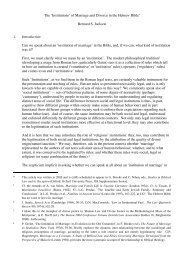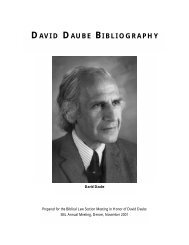Here - Deborah Charles Publications
Here - Deborah Charles Publications
Here - Deborah Charles Publications
You also want an ePaper? Increase the reach of your titles
YUMPU automatically turns print PDFs into web optimized ePapers that Google loves.
- 33 –Birgit KleinBirgit Klein (Hochschule für Jüdische Studien, Heidelberg) – Transfer of Family Property in Early Modern Ashkenazic Jewry inInteraction with non-Jewish Legal Practice (3A)Jewish marital and succession law is notorious for its gender asymmetry. According to the Jewish legal norm in force since antiquity,neither the widow nor the daughter is usually entitled to inherit the estate of a deceased husband or father. This paper will investigate arange of mechanisms that were developed to alleviate this legal discrimination against women, by establishing forms of (legal)protection in formal law and through customary practice. In order to achieve a higher level of equality, principles of non-Jewish legalpractice were introduced into Jewish practice. The resulting legal situation was rather similar to non-Jewish practice. I will describethese developments on the basis of archival files by dealing with the following issues: 1) How were tenaim (marriage contracts withstipulations) applied in lawsuits before non-Jewish courts, in order to protect the dowry from the creditors’ claims? 2) In which termswas the shtar hatzi heleq zakhar (“document of half a male’s portion”) presented and explained to non-Jewish courts? 3) How did non-Jewish lawyers perceive Jewish law and legal practice?Birgit E. Klein has held the chair “History of the Jewish People” at the Hochschule für Jüdische Studien (University of JewishStudies) Heidelberg, Germany, since 2006. For her second German academic degree, the “Habilitation” (Professorqualification), she studied “The Jewish law of marital property and succession in the early modern times: Developments sinceantiquity, and impacts on the gender ratio and the relationship with the non-Jewish society” (submitted to the Freie UniversitätBerlin, Germany, in 2006; to be published in 2012). Her research field is Jewish religious, social, legal, and gender historysince the Middle Ages.Anatoly Kleymenov (Session 7)Anatoly Kleymenov, b. 04.29.1968 (to a mother who is also a lawyer and father who is an historian) has been a member of theMoscow Bar since 1994. He graduated from Moscow State Academy of Law in 1993 and has worked with the law firm of “Mekler& Partners” since 1996. His main area of practice is commercial litigation. In 2011 he received the degree of Candidate of LegalScience from the Institute of State & Law, Russian Academy of Science, for a thesis entitled “The Adversarial Nature of US CivilProcedure”. He takes an active part in the Jewish life of Moscow, and undertakes pro-bono work for Jews with disabilities and lowincome. Ron KleinmanRon S. Kleinman (Ono Academic College), The Halakhic Validity of Civil Law and Civil Adjudication in Israel: The Position ofR. Israel Grossman in Responsa Mishkenot Israel (Session 6A)This presentation examines the position of Rabbi Israel Grossman (1922-2007) on civil law and civil adjudication in Israel, asreflected in his halakhic work, Responsa Mishkenot Israel. Rabbi Grossman was an ultra-Orthodox Israeli rabbinical judge whoserulings relate primarily to the ultra-Orthodox Jewish community in Israel.Responsa Mishkenot Israel deals with halakhot pertaining to condominium housing. Sales contracts of dwelling units incondominium housing projects are based on civil law, which may not be consistent with Torah law. Rabbi Grossman distinguishesbetween the civil law, on the one hand, and the rulings of civil courts of law which interpret the law, on the other. According toRabbi Grossman, dwelling owners are bound by civil law by virtue of the contracts which they sign; however, the interpretation ofthe civil law must be according to principles of Torah law and not according to the rulings of civil courts. We will present a criticalreview of his arguments.Another topic that is examined is the attitude of Rabbi Grossman to local “customs” that violate Israeli building laws. Wesuggest that Rabbi Grossman’s rulings in this regard reveal his general attitude towards the State of Israel and its laws.Prof. Ron S. Kleinman is a full time faculty member of the Ono Academic College School of Law in Israel, where heteaches Jewish Law and Torts. He is the Chairman of the Israeli Committee of the Jewish Law Association (since 2008).His recent research includes:





